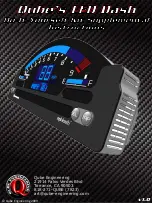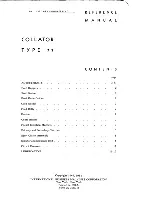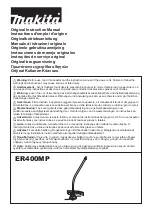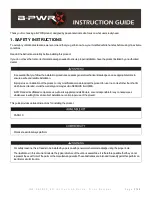
9
USE R GUI DE
|
UVC -5 CONVE Y OR
3.1.3 Effect of the UV radiation on the
eye
Long-wave UV radiation is absorbed
almost exclusively by the lens body. A part
of it can get into and affect the posterior
eye chamber. Short-wave UV radiation is
absorbed by the cornea. Overexposure of
the conjunctiva and cornea causes
inflammation of the conjunctiva and
cornea.
Figure 4.
Eye Incision
Type of radiation
Penetration depth
UV-C and UV-B (in part) Cornea / conjunctiva
UV-B (in part) and UV-A Eye lens
Visible radiation
Retina
IR-A (in part)
Retina, vitreous body
IR-A (in part)
Eye lens
IR-B and IR-C
Cornea / conjunctiva
The transitions and penetration depths are fluid. For
a more precise determination, the degree of
transmission of the individual parts of the eye must
be specified based on the wavelength. Besides, the
permeability of the eye depends on the age. At a
young age, the anterior part of the eye is more
permeable for optical radiation than at an older age.
For further information on the dangers to the eye
caused by optical radiation, we recommend the
report of the employer's liability insurance
association "Risk of damage to the eyes", edition
07/2002.
3.1.4 Protective measures
In general, protective measures against UV
radiation are not difficult to take since this
is a "non-volatile noxious agent" obeying
the simple laws of physics regarding
diffusion. The so-called indirect risks of
short-wave UV radiation resulting from the
generation of ozone can easily be reduced
by placing an exhauster near the radiation
source.
The general protective measures include:
•
Marking of locations where especially powerful
lamps of the UV-C range are installed.
•
Careful check for metallic objects with a smooth
surface in the radiation area which can generate
direct and wide-ranging reflections (cover or
paint them).
•
Use of light-proof protective housings which can
only be removed or opened using a tool and
which are equipped with interlock switches.
•
Loading doors for materials or similar openings
easy to open where radiation can escape should
be equipped with interlock switches.
The employees should be informed about
the installed UV radiation sources and
protective measures. We recommend
reading the publication series of the
German Federal Institute for Occupational
Safety and Health "Protection against
ultraviolet radiation" (ISBN 3-88314-352-9).
3.2 Mercury
UV bulbs contain a small quantity of mercury. If they
are damaged, mercury vapors may escape and
come in contact with skin.
Leave the room and air it thoroughly.
Afterwards, remove the mercury residuals
using a binding agent and dispose of it. We
recommend using the UV safety set from
the manufacturer.






































